FAQ: Who Qualifies for the Social Media Addiction Lawsuit?
- Last Updated: July 14th, 2025

Attorney Jessica Paluch-Hoerman, founder of TruLaw, has over 28 years of experience as a personal injury and mass tort attorney, and previously worked as an international tax attorney at Deloitte. Jessie collaborates with attorneys nationwide — enabling her to share reliable, up-to-date legal information with our readers.
Legally Reviewed
This article has been written and reviewed for legal accuracy and clarity by the team of writers and legal experts at TruLaw and is as accurate as possible. This content should not be taken as legal advice from an attorney. If you would like to learn more about our owner and experienced injury lawyer, Jessie Paluch, you can do so here.
Fact-Checked
TruLaw does everything possible to make sure the information in this article is up to date and accurate. If you need specific legal advice about your case, contact us by using the chat on the bottom of this page. This article should not be taken as advice from an attorney.
Key takeaways:
- The social media addiction lawsuit claim that platforms like Facebook and Instagram knew about the risks but didn't protect young users from mental health issues brought on by addictive features.
- Addiction to social media and suffering physical or psychological harm as a result is a key qualification.
- The plaintiff must also establish that a social media platform breached its duty to provide a safe environment for its users, particularly minors.
Who Qualifies for the Social Media Addiction Lawsuit? Let's Discuss
Question: Who qualifies for the social media addiction lawsuit?
Answer: A person may qualify for the social media addiction lawsuit if they are addicted to social media platforms like Facebook, Instagram, Snapchat, or TikTok, have suffered physical or psychological harm as a result of this addiction, and were under the age of 25 when the addiction began.
Intro to the Social Media Addiction Lawsuit
On this page, we’ll discuss this question in further depth, an overview of the social media addiction lawsuit, potential impacts on mental health issues, and much more.
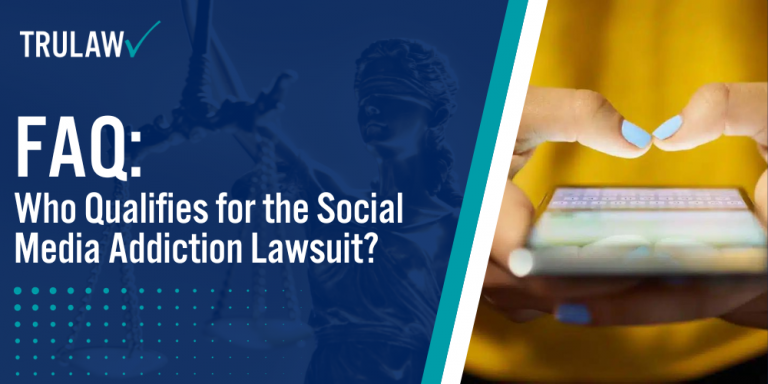
The social media addiction lawsuit seeks to hold social media companies accountable for these effects, particularly in the case of individuals who were under the age of 25 when their addiction began.
Social media addiction can have significant adverse effects on mental health, often leading to conditions such as:
- Anxiety
- Depression
- Eating disorders
- Low self-esteem
- Self-harm
- Suicide.
If you or a loved one is struggling with mental health issues and social media addiction, contact TruLaw for an instant case evaluation using the chat on this page today.
Table of Contents
Youth Mental Health Crisis: Social Media Addiction
Defining social media addiction involves understanding its pervasive nature and recognizing symptoms such as excessive time spent online, neglect of personal life, and mood changes related to social media use.
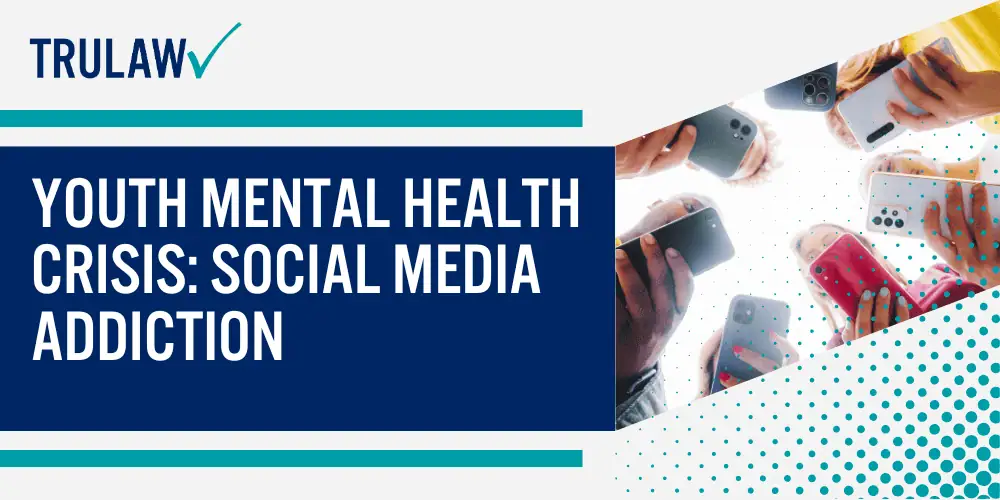
Defining Social Media Addiction
Social media addiction refers to the compulsive use of social media platforms, which significantly impacts an individual’s daily life, behaviors, and well-being.
This behavioral addiction triggers people to spend excessive amounts of time on sites like Facebook, Instagram, TikTok, and other platforms despite experiencing negative consequences in their personal and professional lives.
It often involves a persistent preoccupation with online interactions and an overwhelming desire to log in or check updates.
Individuals dealing with social media addiction may find themselves neglecting face-to-face relationships, work responsibilities, or even their own health.
Signs and Symptoms of Social Media Addiction
Understanding the signs and symptoms of social media addiction is crucial in identifying whether someone may have a valid claim for a lawsuit.
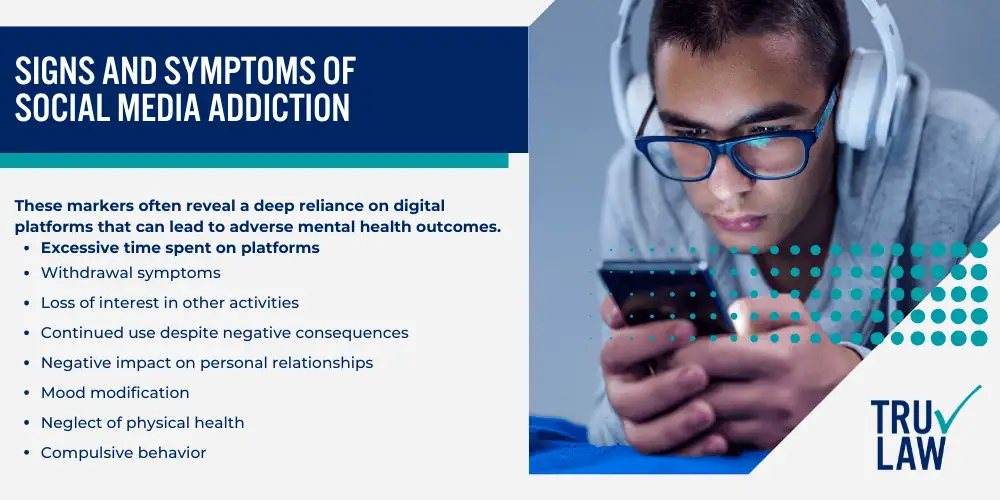
These markers often reveal a deep reliance on digital platforms that can lead to adverse mental health outcomes.
- Excessive time spent on platforms: Users might spend several hours daily scrolling through social media, often resulting in neglected responsibilities or lost sleep.
- Withdrawal symptoms: If unable to access social media, individuals may experience anxiety, restlessness, or irritability—a clear sign of psychological dependence.
- Loss of interest in other activities: A significant drop in participation or enjoyment of previously favored hobbies can indicate that social media has taken precedence.
- Continued use despite negative consequences: Even after facing mental health problems, school issues, or trouble at work due to overuse, users persistently log back in.
- Negative impact on personal relationships: Obsession with online interactions often comes at the cost of real-world connections with friends and family members.
- Mood modification: Some may use social media as a way to escape reality or alter their mood, much like one would with addictive substances.
- Neglect of physical health: Physical harm can occur when excessive screen time leads to poor posture, eye strain, or disrupted sleep patterns.
- Compulsive behavior: The need to check notifications constantly or update statuses without any real purpose demonstrates compulsive tendencies related to addiction.
The Impact of Social Media Addiction
The pervasive influence of social media addiction cannot be underestimated, with its profound repercussions extending to individuals’ mental health and social connections.
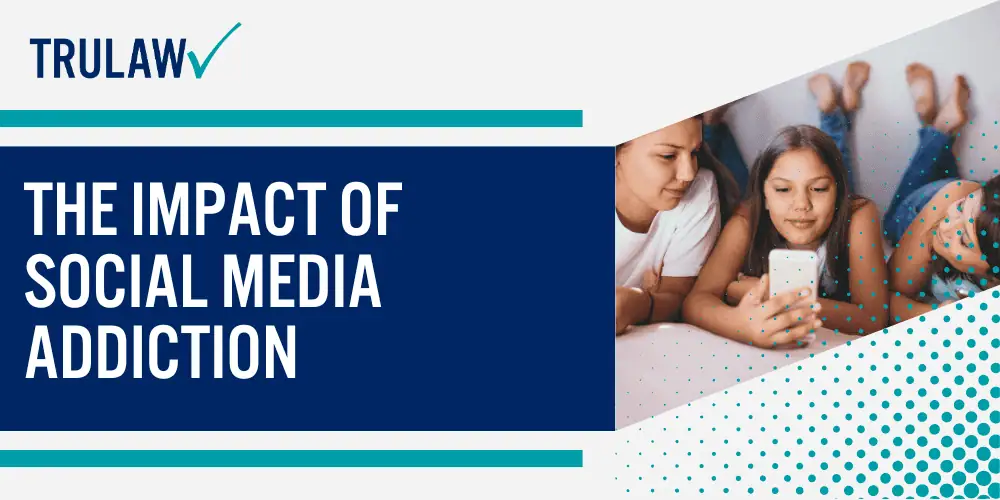
Popular platforms like Instagram and Facebook are intentionally designed to captivate users, often ensnaring them in a cycle of dependency.
Social Media’s Mental Health Effects
The focus of social media addiction lawsuits is to hold Meta accountable for its alleged failure to shield users from content that may lead to suicidal thoughts or actions stemming from the negative impact of excessive social media use on mental well-being.
Scientific research underscores the severe mental health consequences of social media addiction, including:
- Depression
- Anxiety
- Low self-esteem
- Unhealthy eating habits
- Loneliness
- Social isolation
- Reduced physical activity
- Increased risk of self-harm and suicide
- And other detrimental health outcomes.
Warning signs such as persistent sadness, withdrawal from social activities, or disruptions in eating and sleeping patterns indicate that relentless scrolling may be causing more harm than good.
For many young individuals, the endless comparison of their lives to the seemingly perfect ones portrayed online only exacerbates feelings of inadequacy and isolation.
Self-Harm and Suicide in Social Media Addiction
The intertwining of social media addiction with self-harm and suicide raises alarming concerns, as evidenced by extensive research.
This complex issue demands attention and action.
Factors contributing to self-harm and suicide in the context of social media addiction lawsuits may include:
- Cyberbullying: The anonymity and detachment offered by social media platforms can facilitate cyberbullying, leading to severe emotional distress and, in some cases, self-harm or suicidal tendencies.
- Isolation: Excessive screen time and a focus on virtual interactions can contribute to a sense of isolation and loneliness, which are risk factors for self-harming behaviors.
- Idealized Images: Constant exposure to curated, idealized images on social media may exacerbate body image issues, potentially triggering self-destructive behavior.
- Peer Pressure: The desire to fit in and conform to online peer groups can lead to adopting risky behaviors.
Legal Action for Victims
Victims and their families are increasingly turning to the legal system to seek justice for the harm caused by social media addiction.
These lawsuits are founded on the belief that tech giants should be held accountable for the negative consequences of their platforms.
Legal avenues for social media addiction lawsuits:
- Class-Action Lawsuits: Groups of affected individuals come together to seek compensation and demand changes in social media company practices.
- Personal Injury Claims: Individuals seek compensation for the physical and psychological harm caused by social media addiction.
- Privacy Violation Lawsuits: Allegations of privacy breaches and data exploitation may also be part of legal action against social media platforms.
Families of victims seek justice through addiction lawsuits against these technology giants, alleging negligence in safeguarding young individuals from the potentially life-threatening consequences associated with the misuse of social media.
The pursuit of legal action aims to bring attention to the issue and push for greater responsibility and accountability within the industry.
Social Media Addiction Lawsuit: Active Cases
Recent years have seen a surge in the cases filed in the social media addiction lawsuit that’s targeting major social media platforms, with allegations centering on these companies facilitating youth addiction to their services.
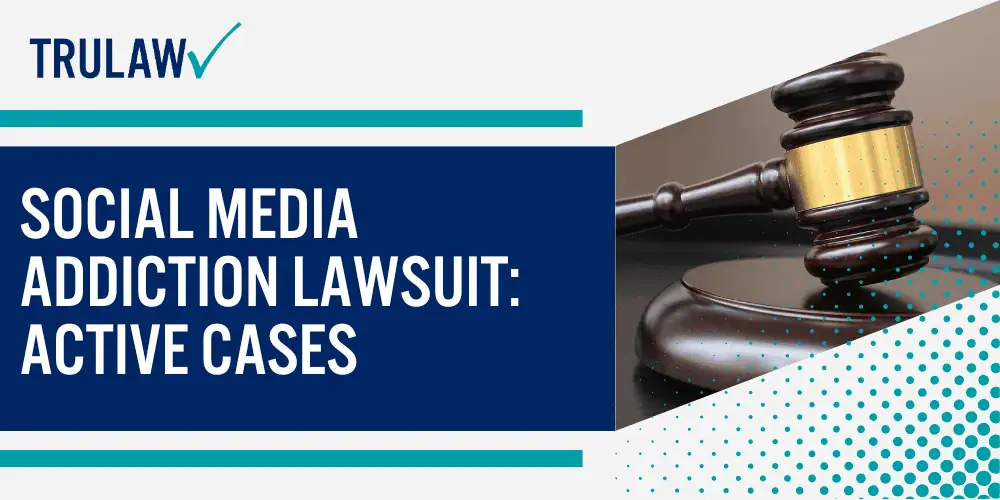
Class Action Lawsuits for Youth Addiction
Parents and guardians are stepping forward with class action lawsuits targeting social media companies for fostering addiction among young users.
These sweeping legal actions aim to hold platforms accountable for the mental and emotional damage caused by their products.
They argue that features built into apps like Facebook and Instagram are designed to hook youth, leading to alarming rates of self-harm, suicidal ideation, and other severe mental health issues.
Lawyers representing these families must demonstrate a duty of care breach by the social media giants—showing evidence that they neglected the safety of their youngest users in pursuit of profit.
Legal battles such as these have high stakes, not only seeking compensation for affected families but also prompting changes within an industry under growing scrutiny over its impact on teen girls and all minors’ well-being.
Meta (formerly Facebook) and Instagram Lawsuits
Legal actions have come down heavily on Meta Platforms Inc., targeting its social media giants, Facebook and Instagram.
With 33 states taking a stand, the lawsuits accuse these platforms of fostering addiction and causing significant mental health issues among young users.
The legal challenges point to design strategies that allegedly prioritize user engagement over safety, resulting in addictive experiences linked to depression, anxiety, and insomnia.
Meta’s approach to enticing teenage users into prolonged use of their platforms is at the heart of the controversy.
The claims are severe: systematic manipulation by designing features that hook users, with little regard for the consequential distress and harm to adolescent well-being.
These lawsuits seek accountability from Meta for not just recognizing potential dangers but also reportedly capitalizing on them at the expense of youth mental health.
Other Companies Facing Lawsuits
Snapchat and TikTok are also in the legal spotlight, with claims stacking up about their role in fostering addictive behaviors among young users.
These social media powerhouses face accusations that they designed platforms to hook adolescents, leading to severe mental health issues.
Unlike traditional products where safety is clear-cut, these companies embed persuasive technology deep into the fabric of daily life for millions of teens.
The list of concerned school districts and parents grows as more individuals come forward with stories of addiction started via incessant scrolling and constant notifications.
With a federal judge giving the green light for multidistrict litigation against such tech giants as Alphabet Inc., responsible for Google’s vast array of services, including YouTube, it signals a recognition that these platforms may be far from neutral playgrounds online.
Each lawsuit challenges the core practices at these firms—suggesting they knew about the potential harm caused yet prioritized engagement over well-being.
Who is Eligible to File a Social Media Addiction Lawsuit?
The criteria for eligibility in a social media addiction lawsuit often hinge on a variety of factors and the tangible impact experienced by minors.
Individuals, particularly younger users who have encountered significant mental health declines as a result of sustained social media use, may have valid grounds to seek legal action.
Parents or guardians might also initiate claims on behalf of their children if they can substantiate that social media’s addictive properties contributed to emotional or psychological harm.
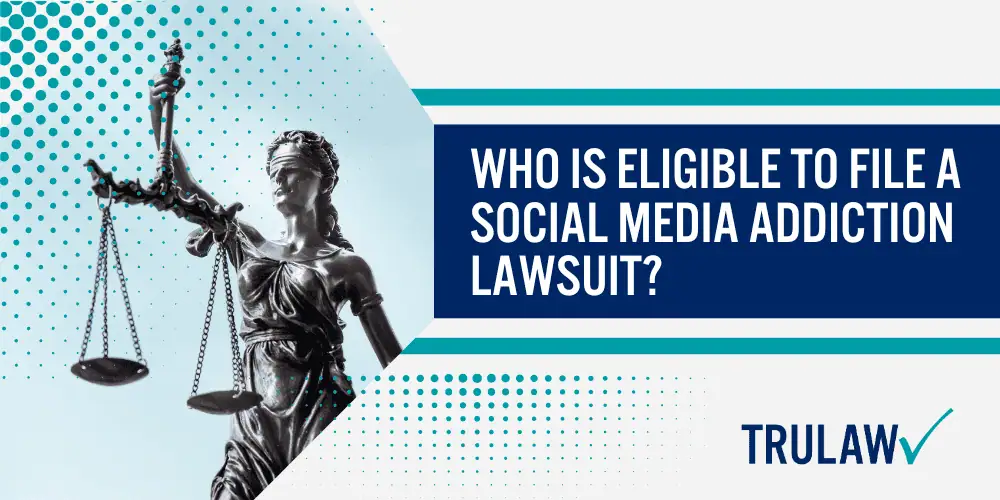
To determine specific eligibility, one must consider whether the individual has suffered measurable damages such as deterioration in mental health, involvement in self-harm or other serious consequences directly linked to social media usage.
Age Restrictions
Age restrictions play a critical role in social media addiction lawsuits, as they determine who may have been unlawfully targeted by the platforms.
Despite most social media companies setting the minimum age for users at 13, there’s evidence that these rules are not consistently enforced effectively.
This lack of enforcement has raised concerns about younger children being exposed to content and behavior that could lead to addictive patterns.
Eligibility for filing a social media addiction lawsuit often hinges on whether the individual was underage when they began using the platform extensively.
Given that lawsuits focus on harm done to minors, those who were under 13 and still allowed access to platforms like Meta (formerly Facebook) and other social media sites could have solid grounds for a claim.
The legal actions underscore the potentially dangerous impact of ignoring age restrictions, particularly how it relates to adolescent addiction and subsequent mental health issues.
Impact on Minors
Minors are at the heart of social media addiction lawsuits, with claims that platforms like Instagram and Facebook have been designed to be irresistibly appealing to young users.
The allegations suggest these companies manipulated algorithms and features, knowing they could lead minors into harmful patterns of excessive use.
This kind of engagement is linked directly with a rise in mental health issues among teens, including anxiety, depression, and even thoughts or acts of self-harm.
The legal actions argue that minors lack the maturity to navigate the addictive nature of social media wisely.
Therefore, when platforms fail to protect their young audience from becoming addicted to daily social media usage, they should be held accountable for negligence.
With 33 states taking on Meta over concerns regarding youth addiction, this underscores the urgency of addressing how other social media companies’ products impact adolescents’ well-being and development.
Social Media Addiction Lawsuit: Potential Settlement Amounts
The landscape of compensation and settlements concerning social media addiction lawsuits.
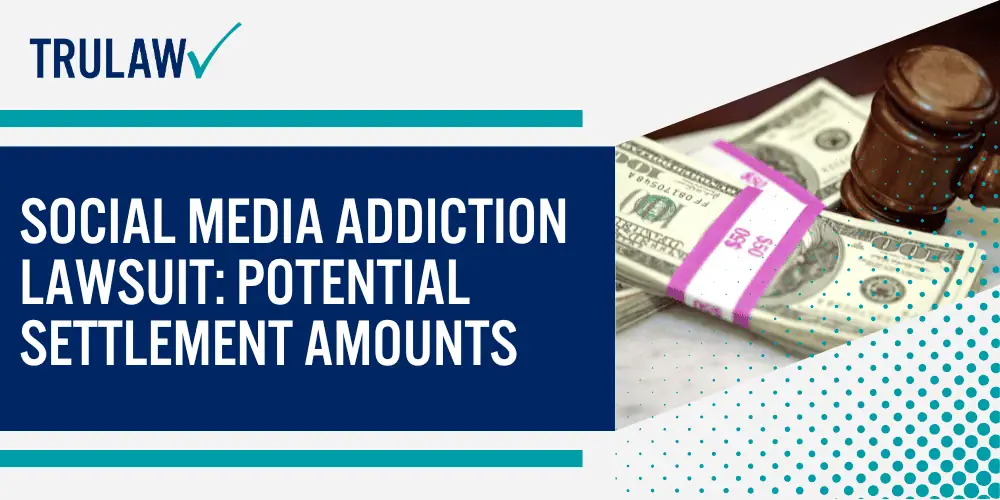
Each case requires meticulous documentation showing causal links between the usage of a platform like Instagram or Snapchat and resultant mental health issues.
Potential Damages for Harm Caused
Victims of social media harm can seek compensation for a wide range of damages due to the debilitating effects of addiction.
Medical expenses, often a significant burden, are just the starting point.
Many individuals also experience profound emotional distress and require ongoing therapy or rehabilitation to address mental health challenges sparked by social media use.
The toll on one’s well-being isn’t limited to psychological effects; pain and suffering also encompass everyday life disruptions.
The quest for justice extends beyond recovery costs; it targets holding responsible those companies whose platforms have contributed to this crisis.
With knowledgeable social media addiction attorneys such as TruLaw, affected parties aim not just for financial redress but also for accountability from these tech giants.
Those enduring hardships can demand restitution for everything lost—financial stability due to accumulated medical bills, opportunities missed because of mental anguish, and overall quality of life diminished by addictive design tactics employed across various platforms within the social media sphere.
Types of Compensation Available
In the social media harm lawsuit, various forms of compensation are considered for individuals facing the aftermath of addiction.
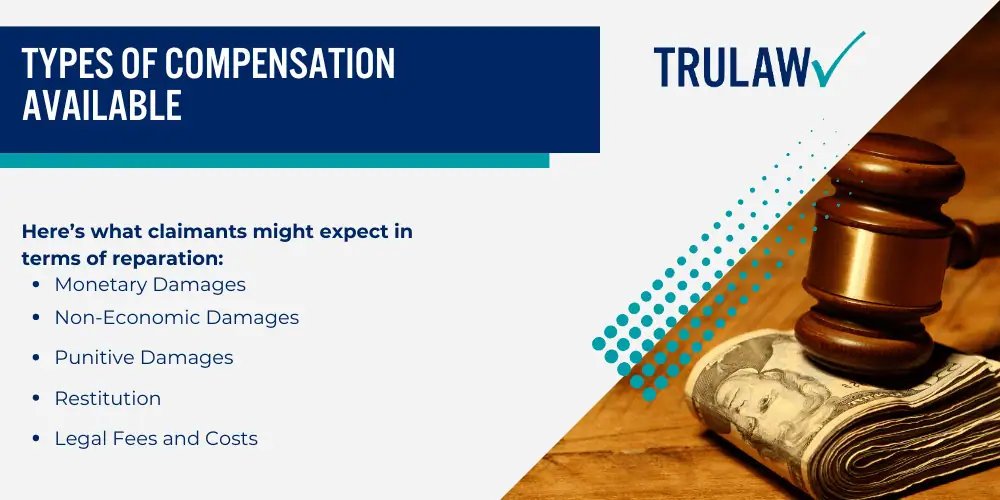
Here’s what claimants might expect in terms of reparation:
- Monetary Damages: Individuals can seek financial compensation for costs related to their social media addiction. This may include therapy fees, lost wages due to inability to work, or other related expenses.
- Non-Economic Damages: These are awarded for the intangible effects of social media addiction, such as pain and suffering, emotional distress, and decreased quality of life.
- Punitive Damages: In some cases where the conduct of the social media company is proven to be particularly harmful or reckless, additional money might be awarded to punish the entity and deter similar future actions.
- Restitution: If applicable, courts may order restitution, which involves reimbursing victims for out-of-pocket losses caused by the addiction.
- Legal Fees and Costs: Often overlooked but equally important, compensation might cover legal expenses incurred while pursuing the lawsuit.
Understand that statutes of limitations will influence how long you have to file your claim – these vary from state to state but generally require prompt action once the harm is recognized.
Gathering Evidence
Gathering evidence is a crucial step in pursuing a social media addiction lawsuit.
It involves collecting records and documentation that show how extensive the use of platforms, such as those owned by Meta (formerly Facebook) or other social media companies, has been.
This could include detailed logs of time spent on social media, any communication with platform representatives regarding concerns about addiction potential, and expert opinions on the user’s mental health condition linked to social media usage.
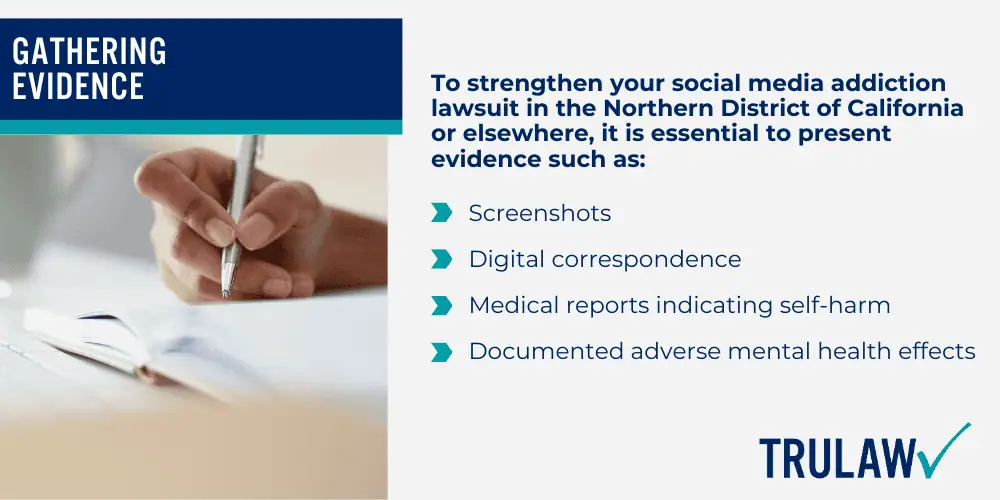
To strengthen your social media addiction lawsuit in the Northern District of California or elsewhere, it is essential to present evidence such as:
- Screenshots
- Digital correspondence
- Medical reports indicating self-harm
- Documented adverse mental health effects
Keeping track of all interactions with these sites will help establish a timeline and intensity of usage that can be critical when demonstrating impact before a court.
Other Social Media Companies Named in Lawsuits
Social media platforms like Facebook, Instagram, Snapchat, TikTok, and YouTube are at the center of numerous lawsuits concerning social media addiction.
These companies face accusations that they failed to create a safe online environment free from addictive elements.
Many plaintiffs argue that these social media giants have designed their platforms deliberately to hook users—especially teens—and keep them engaged for long periods.
The lawsuits highlight serious concerns—some families assert that excessive use of these websites has led to mental health crises among young people.
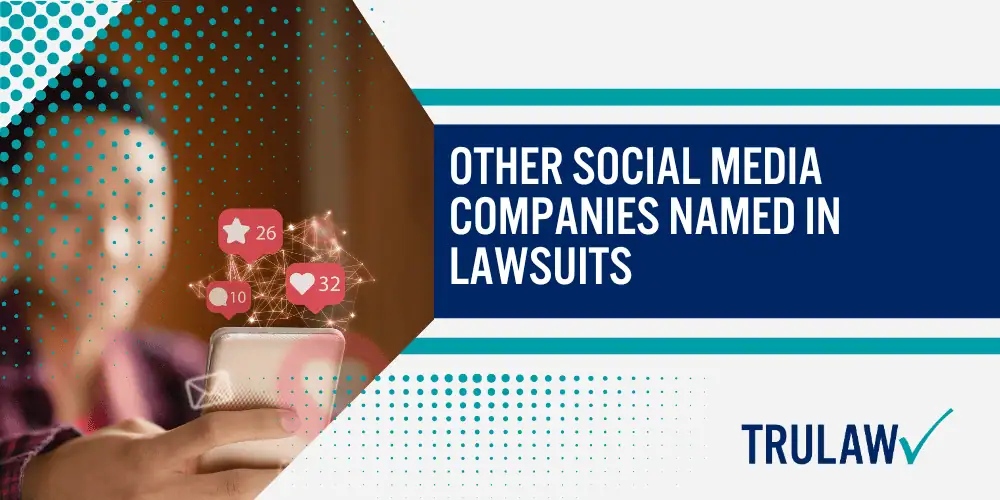
Legal action intensifies as more people claim these platforms prioritize user engagement over well-being despite knowing their potential to cause harm.
A coalition consisting of 42 attorneys general has taken a strong stance against Meta for allegedly exploiting younger audiences with these addictive features.
As the legal battles progress, scrutiny of how other social media companies manage addiction risks continues to grow.
Self-harm incidents linked to social media use among adolescents have risen alarmingly.
Content that glorifies such behavior or presents it as a coping mechanism is easily accessible on these platforms, sometimes leading vulnerable teens down a dangerous path.
With numerous other social media companies facing lawsuits for not doing enough to protect young users from harm’s way, there’s an urgent call for responsibility and action to shield this impressionable demographic from the potential perils posed by their products.
Conclusion
Discussing the social media addiction lawsuits unveils a crucial dialogue on accountability and mental health.
Eligible individuals may now consider legal action as a pathway to address the negative impacts experienced, especially among young users.
If you or a loved one has suffered from mental health issues as a result of using these platforms, contact TruLaw using the chat on this page to receive an instant case evaluation today.
Knowledge empowers those affected by social media’s addictive qualities to seek justice and potentially receive compensation for their hardships.
This marks an essential step towards greater corporate responsibility and user well-being protection on these influential platforms.
Social Media Harm Lawsuits Frequently Asked Questions
-
The social media addiction lawsuit is a rising legal trend against companies like Meta (formerly Facebook), accusing them of intentionally creating addictive platforms that lead to harmful consequences among young users, claiming these platforms can result in physical injuries, such as self-harm and eating disorders.
If you or a loved one is struggling with mental health issues and social media addiction, contact TruLaw for an instant case evaluation using the chat on this page today.
-
You may be eligible to join a social media addiction lawsuit if you or your child are addicted to using social media platforms such as Facebook, Instagram, Snapchat, or TikTok and have suffered physical or psychological harm as a result of this addiction.
If you or a loved one is struggling with mental health issues and social media addiction, contact TruLaw for an instant case evaluation using the chat on this page today.
-
In the context of the ongoing social media addiction lawsuits, minors typically cannot directly initiate or apply to join the lawsuit on their own.
Legal actions involving minors usually require representation through a parent or legal guardian.
The guardian acts on behalf of the minor in legal proceedings, including lawsuits against social media companies.
If you or a loved one is struggling with mental health issues and social media addiction, contact TruLaw for an instant case evaluation using the chat on this page today.
-
Individuals who have experienced severe mental health issues due to social media addiction may have the right to file a lawsuit.
This includes conditions such as depression, anxiety, self-harm, eating disorders, and even instances of suicide or attempted suicide.
If you or a loved one is struggling with mental health issues and social media addiction, contact TruLaw for an instant case evaluation using the chat on this page today.

Managing Attorney & Owner
With over 25 years of legal experience, Jessica Paluch-Hoerman is an Illinois lawyer, a CPA, and a mother of three. She spent the first decade of her career working as an international tax attorney at Deloitte.
In 2009, Jessie co-founded her own law firm with her husband – which has scaled to over 30 employees since its conception.
In 2016, Jessie founded TruLaw, which allows her to collaborate with attorneys and legal experts across the United States on a daily basis. This hypervaluable network of experts is what enables her to share the most reliable, accurate, and up-to-date legal information with our readers!
Additional Social Media Harm Lawsuits resources on our website:
Here, at TruLaw, we’re committed to helping victims get the justice they deserve.
Alongside our partner law firms, we have successfully collected over $3 Billion in verdicts and settlements on behalf of injured individuals.
Would you like our help?
At TruLaw, we fiercely combat corporations that endanger individuals’ well-being. If you’ve suffered injuries and believe these well-funded entities should be held accountable, we’re here for you.
With TruLaw, you gain access to successful and seasoned lawyers who maximize your chances of success. Our lawyers invest in you—they do not receive a dime until your lawsuit reaches a successful resolution!
AFFF Lawsuit claims are being filed against manufacturers of aqueous film-forming foam (AFFF), commonly used in firefighting.
Claims allege that companies such as 3M, DuPont, and Tyco Fire Products failed to adequately warn users about the potential dangers of AFFF exposure — including increased risks of various cancers and diseases.
Depo Provera Lawsuit claims are being filed by individuals who allege they developed meningioma (a type of brain tumor) after receiving Depo-Provera birth control injections.
A 2024 study found that women using Depo-Provera for at least 1 year are five times more likely to develop meningioma brain tumors compared to those not using the drug.
Suboxone Tooth Decay Lawsuit claims are being filed against Indivior, the manufacturer of Suboxone, a medication used to treat opioid addiction.
Claims allege that Indivior failed to adequately warn users about the potential dangers of severe tooth decay and dental injuries associated with Suboxone’s sublingual film version.
Social Media Harm Lawsuits are being filed against social media companies for allegedly causing mental health issues in children and teens.
Claims allege that companies like Meta, Google, ByteDance, and Snap designed addictive platforms that led to anxiety, depression, and other mental health issues without adequately warning users or parents.
Transvaginal Mesh Lawsuits are being filed against manufacturers of transvaginal mesh products used to treat pelvic organ prolapse (POP) and stress urinary incontinence (SUI).
Claims allege that companies like Ethicon, C.R. Bard, and Boston Scientific failed to adequately warn about potential dangers — including erosion, pain, and infection.
Bair Hugger Warming Blanket Lawsuits involve claims against 3M — alleging their surgical warming blankets caused severe infections and complications (particularly in hip and knee replacement surgeries).
Plaintiffs claim 3M failed to warn about potential risks — despite knowing about increased risk of deep joint infections since 2011.
Baby Formula NEC Lawsuit claims are being filed against manufacturers of cow’s milk-based baby formula products.
Claims allege that companies like Abbott Laboratories (Similac) and Mead Johnson & Company (Enfamil) failed to warn about the increased risk of necrotizing enterocolitis (NEC) in premature infants.
Here, at TruLaw, we’re committed to helping victims get the justice they deserve.
Alongside our partner law firms, we have successfully collected over $3 Billion in verdicts and settlements on behalf of injured individuals.
Would you like our help?
